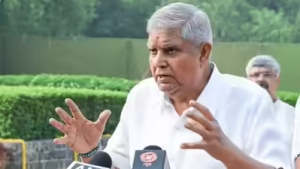New Delhi – The Jagdeep Dhankhar resignation has sent shockwaves across India’s political landscape as the Vice President of India announced his immediate departure from office on Monday, July 21, 2025. In an unprecedented move, Dhankhar cited health reasons as the primary factor behind his decision to step down from the nation’s second-highest constitutional position.
The Jagdeep Dhankhar resignation letter, submitted to President Droupadi Murmu, invoked Article 67(a) of the Constitution, making his departure effective immediately. This marks a rare occurrence in Indian political history, as Vice Presidents typically complete their full five-year terms unless extraordinary circumstances arise.
Constitutional Framework Behind the Decision

The Jagdeep Dhankhar resignation follows proper constitutional protocol as outlined in Article 67(a), which provides the legal framework for a Vice President to tender resignation before completing their term. Dhankhar’s decision to prioritize healthcare and follow medical advice demonstrates the seriousness of his health concerns, though specific details about his condition have not been disclosed publicly.
Since assuming office in 2022, the Jagdeep Dhankhar resignation concludes a tenure that began with significant promise. His background as the former Governor of West Bengal from 2019 to 2022 provided him with extensive administrative experience that he brought to his role as Vice President and ex-officio Chairman of the Rajya Sabha.
Also Read: Congress On Shashi Tharoor: Shocking Loyalty Controversy Sparks Internal Rift
Gratitude and Acknowledgments in Resignation Letter
In his resignation communication, the Jagdeep Dhankhar resignation letter expressed profound gratitude to key constitutional authorities and political figures. He specifically thanked President Droupadi Murmu for her “unwavering support and the soothing wonderful working relationship” they maintained throughout his tenure.
The Jagdeep Dhankhar resignation also included heartfelt appreciation for Prime Minister Narendra Modi and the Council of Ministers. Dhankhar acknowledged that the Prime Minister’s cooperation and support proved invaluable, stating he learned significantly during his time in office. This collaborative relationship between the executive and the Vice President’s office had been crucial for smooth governmental operations.
Parliamentary Relations and Legacy
Members of Parliament across party lines received special mention in the Jagdeep Dhankhar resignation letter. He expressed that the warmth, trust, and affection from all honorable Members of Parliament would remain eternally cherished and embedded in his memory. This acknowledgment highlights the importance of maintaining cordial relationships across the political spectrum in India’s parliamentary democracy.
The Jagdeep Dhankhar resignation reflects his satisfaction with witnessing India’s remarkable economic progress and unprecedented exponential development during his tenure. As Vice President, he had a front-row seat to observe the nation’s transformation during what he described as a significant period in Indian history.
Economic and Developmental Achievements Witnessed
During his tenure, the Jagdeep Dhankhar resignation letter noted his privilege in observing India’s global rise and phenomenal achievements. He expressed unwavering confidence in the nation’s brilliant future, highlighting the transformative era he was honored to serve during. This period saw significant economic milestones and developmental initiatives across various sectors.
The Jagdeep Dhankhar resignation coincides with India’s continued ascent on the global stage, with the country achieving notable success in technology, space exploration, and international diplomacy. His tenure witnessed several landmark achievements that reinforced India’s position as an emerging global power.
Constitutional Succession and Immediate Implications
Following the Jagdeep Dhankhar resignation, constitutional experts point out that India’s Constitution does not explicitly specify who performs Vice Presidential duties when a vacancy occurs before term expiry. However, specific provisions exist for the Vice President’s role as Rajya Sabha Chairperson.
The Jagdeep Dhankhar resignation triggers the constitutional mechanism where the Deputy Chairperson of the Rajya Sabha, or another member authorized by the President, assumes the responsibility of chairing the upper house during this vacancy period. This ensures continuity in parliamentary proceedings despite the sudden departure.
Looking Forward: India’s Democratic Resilience
The Jagdeep Dhankhar resignation demonstrates the maturity of India’s democratic institutions in handling unexpected constitutional situations. The smooth transition process and proper adherence to constitutional procedures reflect the strength of the nation’s democratic framework.
As India moves forward from the Jagdeep Dhankhar resignation, the focus shifts to the selection process for a new Vice President. The electoral college comprising Members of Parliament from both houses will eventually elect a successor to complete the remaining term and continue serving as the Rajya Sabha’s presiding officer.
This unprecedented Jagdeep Dhankhar resignation marks the end of a significant chapter in contemporary Indian politics while opening discussions about health considerations in high constitutional offices and the importance of medical advice in public service decisions.

